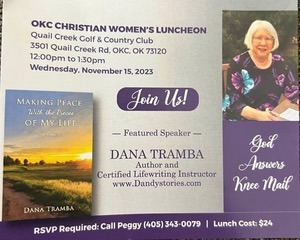Denis Ledoux: Can you tell our readers what your book, Making Peace with the Pieces of My Life, is about and why you were compelled to write your book? What was driving you to spend the time, energy, and money to get this book out into the world?
Dana: I wanted to reach the divorced or those parenting a child with a heroin addiction. Adoptees doing DNA and searching for their birth family. My story became a story I had to tell so they knew they were not alone and hopefully find peace at the end of their journey.
Denis: Can you tell us how long it took from the time you conceived Making Peace with the Pieces of My Life to the time you had it published? How many years did you spend in active writing? Were there long breaks in between active writing periods? If so, what happened to get you writing again?
Dana: I have been a lifelong – crisis journaler, meaning I wrote during a crisis. When COVID hit, I was isolated and bored. I started typing my journals into the computer. Around 20 years ago, I became a Certified Life Writing Instructor with Denis Ledoux through the Soliel Lifewriting Network. I felt a little guilty teaching and not having my own memoir. Writing a book was on my bucket list. I began to see a story forming from my journal entries. It took me two years to complete the book.
Denis: You must have had periods of time in which you were discouraged or at least less enthusiastic. Can you tell us about how you kept yourself going? What worked for you?
Dana: I signed up for a writing course from Richard Crum, a previous National Geographic editor. Weekly, I had to prepare something to read through with him. He helped me learn to write better and tie my stories together. Investing money in your writing project motivates you to complete it quicker. I began rewriting my journal entries, which started the process of writing my book.
Denis: Tell us what the theme of Making Peace with the Pieces of My Life was. How did you come upon this theme? Do you feel you were successful in getting your theme across to the reader?
Dana: As I wrote my collection of stories, the repetitive theme was dealing with a crisis. I was a divorcee. We also had a son who had a heroin addiction. For sixty years, I longed to find my Birth Mother.
Writing caused me to look back at my life. I saw where I tried to solve all the problems myself. I should have turned my problems over to God. The doors opened, and my story touched many lives. It has allowed me to speak about Making Peace with the Pieces of My Life at women’s groups.

Denis: Is there anything in particular you would say was the most difficult thing to succeed at in this book? Was it scheduling, research, plotting, point of view, believing in yourself, or what else?
Dana: The tricky part is thinking I am not a good enough writer and nobody will want to read my book. I also worried people would think I made some dumb decisions. Living through the painful memories again while writing was the most challenging part.
Writing helped me reunite with my younger self through many seasons of my life. I relived and wrote all my feelings down on paper. In the end, it was good therapy for me. Then, I decided which stories and emotions to keep in my manuscript.
Denis: Was there a success trait you have discerned for the process of writing? That is, are there best practices you would recommend to readers that would facilitate completing her/his memoir? EG. working on schedule, quitting not being an option, external physical or emotional support from someone, etc.
Dana: Twenty years ago, I remember Denis saying to write 16 ½ minutes a day. You start writing, and time lengthens. I write, write, write, and then I have to let it sit for a few days before I pick up my manuscript and reread it. Writing is a part of my soul, and I write daily. Remember, 16 ½ minutes = 2 hours a week = 6 weeks a year of writing.
Denis: How have you dealt with self-doubt?
Dana: As I wrote my stories, I was encouraged when Richard Crum would say, “This is a good story. You should make this into a novel and a movie.” He helped me pause and look at myself, and his encouragement made me feel I could do this. I am not quite at the novel or movie stage. That doesn’t sound very easy. Completing my memoir helped me overcome any self-doubt.
Denis: What makes for a successful memoir? Do you feel your memoir was a success?
Dana: People started coming to me, saying, “I laughed and cried. It felt like I was sitting at the kitchen table with you, having a conversation. Others would whisper to me, “I have been there too.” Referring to a child with addiction. I was surprised when men started commenting on my book. When I touched the lives of the readers, it was a success. Plus, it was a therapeutic journey for me.
Denis: How do you recommend people deal with sensitive material that relatives might take offense at?
Dana: I had everyone I talked about in my book read that part of the manuscript, or I changed their names if I could not make contact. My sister was offended by the way I spoke about our mother. But we were treated differently, and it was my story. Because she was so upset, I adjusted my story slightly so it did not sound harsh and added more kind, accurate comments about her. But, writing the truth was therapeutic for me. It felt good on draft one to get all the negative feelings out of my system.
Denis: Did you envision yourself as a writer before you began Making Peace with the Pieces of My Life? What is your identity as a writer now?
Dana: I have facilitated memoir classes for over 20 years, encouraging others to Save Your Life One Story at a Time. I want them to leave a legacy for their family. Now, I get to tell people I am an author and show them my book. I even sell them out of the trunk of my car. After writing my book, I need to change the strategy of the classes I teach. There are so many facts and stories that can be on the dull side. I want to encourage them to put their feelings into their story.
Denis: Will you write another memoir? Why or why not?
Dana: I plan to use stories from my memory list that I did not publish in this book and turn them into devotions. The book will be titled Simple Grace. At the end of each devotion, I have a Simple Grace activity. Example. If you hug someone today, be the last to let go.
Denis: How have people reacted to Making Peace with the Pieces of My Life? What sort of feedback have you received?
Dana: I have received positive feedback. My first lecture and book signing was for 80 ladies at our retirement facility. Daily, I get comments from people on parts of my book and how they enjoy and relate to my story. I was amazed at the men that read and liked my book. I have sold around 250 copies.
Denis: Was selling copies important to you? If so, what sort of outreach have you done to pursue sales: did you speak to groups, do guest blogging, do interviews, etc.
Dana: Selling was not important to me. I felt it was a ministry to write my book. I had a book signing in my hometown of Lewis, Kansas, and at privately owned books stores in Oklahoma. I have spoken at luncheons and sell my books after my talk. I have some in the trunk of my car I sell all the time. I also have a website, Dandystories.com, which I promoted on Facebook. A lesson I have learned is do NOT give your books away. I have done that to a few people and discovered they do not read it if they do not invest money in the book. I was disappointed I did not get instant feedback when I gifted books.
Denis: What are your future writing plans?
Dana: I am writing a devotional book titled Simple Grace. Devotions on Aging Gracefully. (I have a granddaughter, Gracelyn, to whom I will dedicate it.)
For more interviews by Memoir Network writers, click here.
For YouTube videos on better memoir writing, click here.
 What would happen to the memoir conversation if…
What would happen to the memoir conversation if…
- …you took a moment to present this informative post to your friends and family by linking this article on your social media? Just a click. It’s so easy.
- …you reposted this article on your own blog or website? It’s free and you’d both have some valuable content to boost your blog’s reputation and you would be providing your readers with valuable guidance. For the best procedure on how to do this, click here.
- …you subscribed to our YouTube channel?


No comments yet.